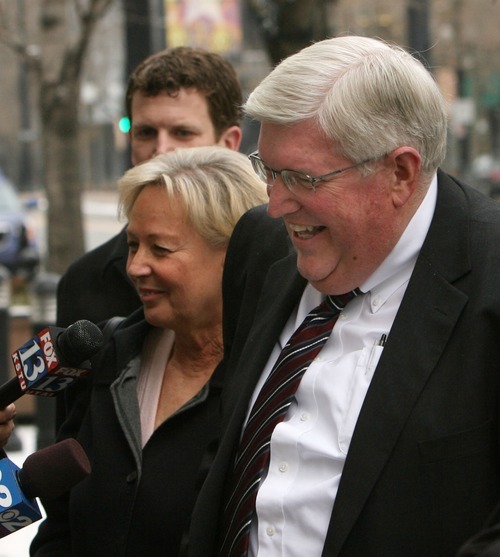This is an archived article that was published on sltrib.com in 2012, and information in the article may be outdated. It is provided only for personal research purposes and may not be reprinted.
Irritated with prosecutors who argued that property belonging to a Brigham City doctor convicted of illegally prescribing pain medication should be forfeited, a federal judge on Wednesday accused attorneys of having a vendetta against the defendant.
"It does seem to me that you and the DEA have taken everything you can from this family," U.S. District Judge Dee Benson told federal prosecutors during a Wednesday forfeiture hearing for Dewey C. MacKay. "I just wonder where this crosses the line to almost a vindictiveness by the prosecution."
MacKay, 64, was convicted by a federal jury in August on 40 counts related to illegally distributing painkillers. They also found MacKay guilty of two counts of distribution of a controlled substance resulting in death, three counts of use of a communication facility in a drug trafficking offense, and 35 counts of distribution of a controlled substance. The doctor was acquitted on 44 other distribution counts.
A five-week trial for MacKay stemmed from an August 2010 indictment on charges related to prescribing more than 1.9 million hydrocodone pills and nearly 1.6 million oxycodone pills between June 1, 2005, and Oct. 30, 2009.
Benson sentenced MacKay last month to a mandatory minimum sentence of 20 years in prison and allowed self-report to prison on Feb. 1.
But in a flurry of last-minute filings before MacKay's sentencing, his attorneys asked Benson to allow the defendant to stay out of prison while his attorneys appeal his case, citing his military service, volunteerism in the community and low flight risk due to medical conditions, including diabetes. Prosecutors have argued MacKay belongs in prison.
At a Wednesday hearing, attorneys argued the issue of delaying MacKay's date to report to prison, along with issues related to the forfeiture of MacKay's property.
Assistant U.S. Attorney Richard Daynes asked Benson to grant an approximately $72,000 judgment in favor of the government. Daynes argued that MacKay forfeit his medical license and two bank accounts associated with the Brigham City Orthopedic Clinic where he practiced. The bank accounts contain $53,905 and $18,701, respectively.
Prosecutors also asked for a Chevy Silverado truck that MacKay allegedly used to deliver prescription drugs to a patient and $2,520 in cash — profits he received from 36 office visits. The 36 office visits are connected to the counts for which MacKay was convicted.
The U.S. Attorney's Office is charged with collecting debts owed to the United States. The office generally seeks forfeited assets in cases like MacKay's, which are sometimes sold and the profits used to pay restitution to crime victims or local law enforcement agencies that participated in investigating certain cases.
MacKay's defense attorney, Nathan Crane, disputed the government's request, pointing out that prosecutors had filed incorrect information in a brief asking that the truck be seized for profit. Crane pointed out that MacKay didn't own the truck prosecutors requested until a date after the crimes he was charged with occurred.
Crane also argued there is not evidence to show that profits made at the Brigham City Orthopedic Clinic were connected to a crime — an argument Benson seemed to agree with, noting that some of MacKay's patients saw the doctor for a legitimate medical purpose, which should keep the government from seizing all profits associated with the business.
Benson chided prosecutors for sloppiness in their briefs, saying that if defense attorneys had not caught the incorrect information about the truck and other issues, that the government "may have been awarded property the law doesn't allow you to have."
Daynes admitted that prosecutors backed down from some requests for property made in filings in late November after researching forfeiture issues further.
Benson took the forfeiture issue under advisement and continued arguments related to keeping MacKay out of prison pending an appeal to Jan. 11.
He said at the conclusion of Wednesday's hearing that he is "not inclined" to grant the defense's request to keep MacKay out of prison during his appeal. He also said he likely won't grant prosecutors' request for the $72,000 judgment.
At MacKay's trial, prosecutors argued that MacKay did not conduct physical exams or question patients to determine whether they were abusing or selling the drugs, despite cases in which a patient's family member called to report prescription abuse.
MacKay was accused of pushing 80 to 120 patients through his office in an eight-hour workday, spending just minutes with each person. The Drug Enforcement Administration revoked MacKay's authorization to prescribe controlled substances after completing an investigation that led to his indictment.
Among the counts MacKay was convicted of was causing the death of 55-year-old David Leslie Wirick in 2006. Wirick, a rocket scientist at Alliant Techsystems, died of a drug overdose during a three-day binge after filling prescriptions from MacKay.
The U.S. 10th Circuit Court of Appeals last month refused to reinstate MacKay's ability to issue controlled substances after the doctor's attorneys tried to argue to reinstate his privilege to prescribe.
Several prominent Utahns wrote letters to Benson on behalf of MacKay before the sentencing, including Rep. Rob Bishop, R-Utah, and Utah State Senate Majority Assistant Whip Peter Knudson, R-Brigham City.
Twitter: @mrogers_trib



